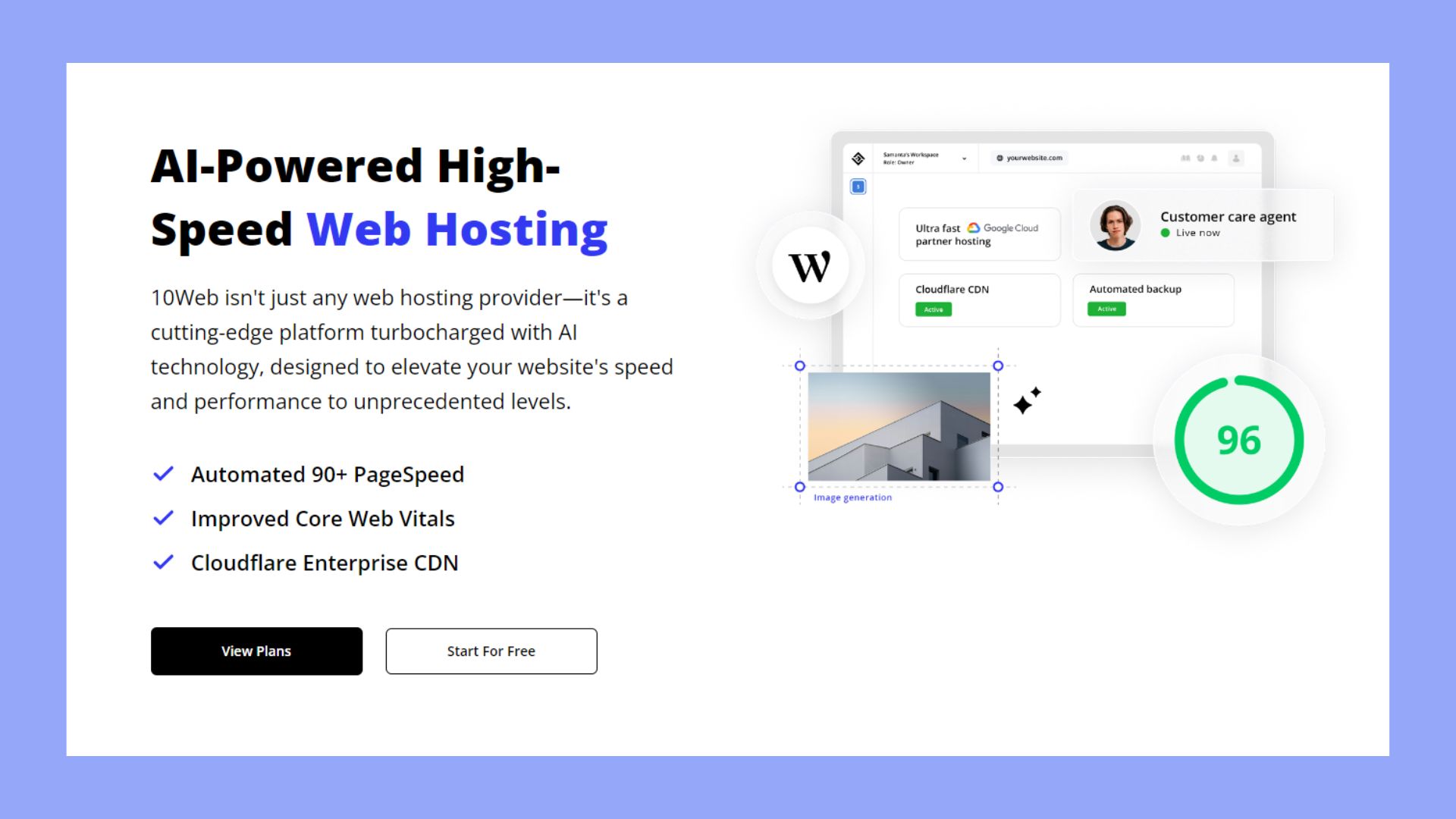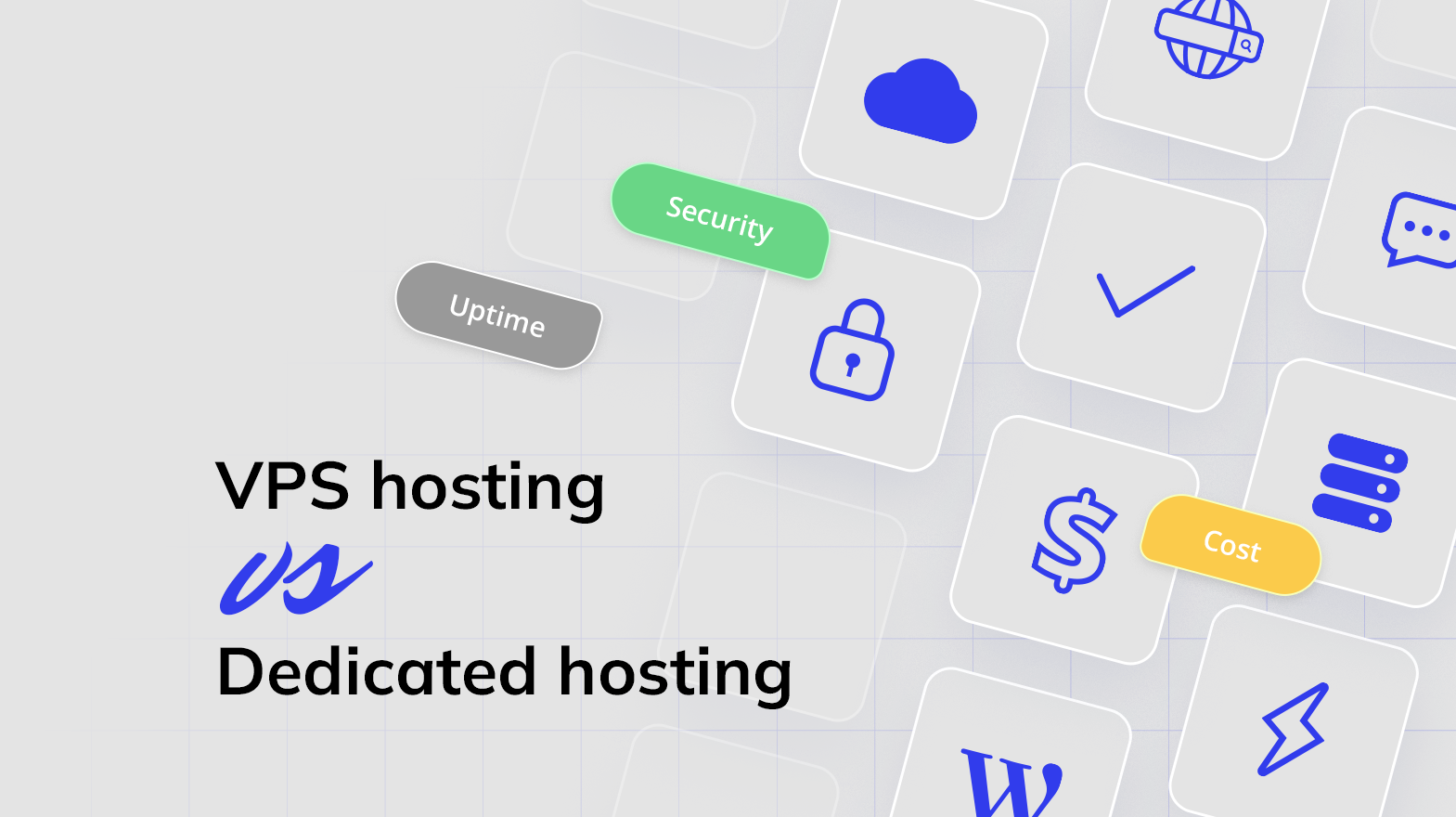It’s important to understand how VPS hosting vs dedicated hosting align with your website’s needs, performance requirements, and budget, when choosing between the two. VPS hosting offers a cost-effective solution with dedicated resources in a shared environment, making it ideal for medium-sized websites or growing businesses. In contrast, dedicated hosting provides full server control and exclusive resources, ensuring high performance and customization, but at a higher cost.
This article will walk you through the key differences between VPS and dedicated hosting, helping you make an informed decision for your website.
FAQ
Which is better, VPS or dedicated server?
The choice between VPS and dedicated server hosting depends on your needs. VPS offers a more affordable solution with dedicated resources but still shares a physical server with other users. Dedicated servers provide full control and exclusive use of all server resources, making them ideal for high-traffic or resource-intensive websites, but they are more expensive.
Is VPS hosting better?
VPS hosting is better for users who need more control and resources than shared hosting but don’t require the full power of a dedicated server. It offers a balance of cost-effectiveness, scalability, and performance. However, dedicated servers are better for websites needing maximum performance and customization.
What is the difference between shared hosting, dedicated hosting, and VPS hosting?
Shared hosting involves multiple websites sharing resources on a single server, making it the most affordable but least powerful option. VPS hosting provides dedicated resources within a shared environment, offering better performance and control than shared hosting. Dedicated hosting gives a single user full control over an entire server, providing the best performance, but at a higher cost.
What is the difference between VPS and dedicated IP?
VPS refers to a virtual private server, which gives you dedicated resources on a shared server, while a dedicated IP refers to having a unique IP address assigned to your website. A VPS may come with a shared or dedicated IP, but a dedicated IP offers benefits like better email deliverability and SSL certificate management. Both can work together depending on your hosting needs.
What is VPS hosting
Virtual Private Server (VPS) hosting is a solution that provides dedicated resources on a server shared with other users. It’s an excellent choice for websites that require more power than shared hosting but do not need the full capacity of a dedicated server.
How does VPS hosting work?
VPS hosting operates by using virtualization technology to divide a physical server into multiple virtual compartments. Each virtual server, or virtual private server, functions with its own operating system and resources.
The key component in this process is the hypervisor, which ensures each VPS is isolated from the others on the same physical machine. This setup allows users to install software and manage their resources independently, providing flexibility and control similar to a dedicated server.
Advantages of VPS hosting
VPS hosting offers several benefits that make it appealing for growing websites.
One significant advantage is scalability. Users can easily upgrade resources like CPU, RAM, and storage as their site grows without major downtime. This setup is typically more cost-effective compared to having a dedicated server, as users only pay for the resources they need.
Another advantage is its balance of performance and price. Unlike shared hosting, the resources in VPS hosting are allocated just for one user, which boosts performance. The use of virtualization ensures that one user’s activities won’t impact others. This hosting model is ideal for businesses experiencing web traffic growth and those who need more control over their server environment.
Disadvantages of VPS hosting
While VPS hosting provides a range of benefits, there are also some drawbacks.
One of the primary concerns is the cost, which is higher than shared hosting. Although it is more affordable than dedicated hosting, it does require a budget adjustment for businesses moving from a basic setup.
Another issue is the level of technical knowledge required. Managing a VPS typically demands skills in server administration. This can pose a challenge for those who aren’t tech-savvy or don’t have a dedicated IT team. Furthermore, while VPS hosting can handle traffic spikes better than shared hosting, it may not offer the same level of performance or security as a dedicated server.
VPS hosting versus dedicated hosting involves weighing these factors to determine which solution best fits specific business needs.
What is dedicated hosting
Dedicated hosting means renting an entire physical server for a client’s personal use. This setup is ideal for businesses that require full control over their server’s configurations and resources. This service can provide more stability and performance compared to shared options like VPS hosting.

How does dedicated hosting work?
Dedicated hosting provides a single tenant, or client, sole access to a physical server. The server is maintained in a data center, offering improved connectivity, security, and uptime. Because resources are not shared, clients can customize the server hardware and software to fit their specific needs.
Clients may choose fully managed dedicated hosting, where the provider oversees server management, updates, and troubleshooting. This ensures they can focus on their core business. The physical server runs on one operating system and hosts one client, providing maximum resource availability. This differs from VPS hosting, where the server’s resources are divided among multiple users.
Advantages of dedicated hosting
The primary benefit of dedicated hosting is performance. Since the entire server is dedicated to one client, there are no limitations on CPU, RAM, and bandwidth caused by resource sharing. This is crucial for high-traffic websites and applications requiring strong performance.
Security is another advantage. Because there is only one client per server, the risk of security breaches is lower compared to shared environments. Businesses handling sensitive data often prefer this hosting for enhanced privacy. Clients can install security measures tailored to their needs.
Customization options allow businesses to choose their server specifications and software, ensuring optimal performance for specific workloads. This level of control is not possible with shared or VPS hosting, where the client’s options are limited by shared environments.
Disadvantages of dedicated hosting
The primary drawback of dedicated hosting is its cost. Renting an entire server can be expensive, making it less feasible for small businesses or those with limited budgets. The price reflects the benefits of customization and high performance, often ranging from $60 to $300 per month.
Management complexity can be a challenge. Unless opting for fully managed hosting, clients must handle server maintenance, updates, and troubleshooting themselves, which requires skilled IT personnel. This can be a burden for businesses without technical expertise.
Scalability is less flexible than with VPS hosting. Adjusting resources often means upgrading hardware, rather than simply allocating more space or bandwidth. This can delay scaling efforts and increase overall costs.
Similarities of VPS hosting and dedicated hosting
VPS hosting and dedicated hosting share some similarities, even though they cater to different needs.
Both types offer greater control compared to shared hosting. Users have the ability to configure their server environment, install software, and customize settings to suit specific needs.
Security is another area where these hosting options align. They provide a higher level of security compared to shared hosting. Users can set up custom firewalls and security protocols to keep data safe. Both options include features like SSL and DDoS protection for an added layer of security.
Each offers dedicated resources to their users. This is true even for VPS hosting where resources are allocated specifically to each virtual server. This ensures consistent performance for users.
Customization and flexibility are strong points. Both allow users to select hardware and software options that match their website’s requirements. This feature is beneficial for businesses with specific needs.
Finally, support is usually part of the package with both VPS and dedicated hosting. Providers often offer technical support, helping businesses maintain smooth operations and troubleshoot any issues quickly.
Differences between VPS hosting and Dedicated hosting
Understanding the key differences can help you make an informed decision based on your specific needs and budget. Here’s a breakdown of the most important distinctions.
- Cost: VPS hosting is typically more affordable than dedicated hosting. Prices for VPS can range from about $20 to $150 per month. Dedicated hosting, on the other hand, usually costs between $60 and $300 per month. This makes VPS a popular choice for small businesses and websites with smaller budgets.
- Resource allocation: In VPS hosting, several virtual servers share space on a physical server. Each VPS acts independently, with its own resources like CPU and RAM. In contrast, dedicated hosting gives a single user the entire server, resulting in exclusive access to all the server’s resources.
- Performance: Dedicated hosting often offers better performance because no resources are shared with others. Servers are fully committed to one client. VPS hosting can still offer strong performance, but since resources are shared among users, this can sometimes affect speed and responsiveness.
- Scalability: VPS hosting is generally more scalable than dedicated hosting. Users can easily upgrade resources like CPU and RAM as their needs grow. With dedicated hosting, scaling often involves adding more physical hardware, which can be more complex and expensive.
- Management and control: VPS hosting usually requires less technical knowledge, especially if choosing a managed plan. Dedicated hosting gives more control over the server, which can be beneficial for users who need specific configurations. However, this also means more technical expertise is required to manage and optimize the server.
Comparison
When choosing between VPS (Virtual Private Server) hosting and dedicated hosting, the decision often comes down to resource needs, budget, and control over server environments. VPS hosting offers a more cost-effective, scalable option, while dedicated hosting provides full server control with dedicated resources.
| Comparison Point | VPS Hosting | Dedicated Hosting |
|---|---|---|
| Performance | Good performance, but resources are shared among multiple users. | High performance, with full resources of a server dedicated to one user. |
| Scalability | Easily scalable by upgrading resources within the virtual environment. | Scalability is limited and requires upgrading hardware or switching servers. |
| Reliability | Reliable but could be impacted by other users on the same server. | Highly reliable, as all resources are dedicated to one user, minimizing risks. |
| Management | Typically offers managed and unmanaged options, with less technical control. | Requires advanced technical knowledge; full control over server management. |
| Customization | Limited customization due to shared resources, though some root access is provided. | Full customization of server settings and configurations. |
| Security | Good security, but shared hosting environments increase vulnerability. | High-level security due to isolated server environment and user control. |
| Migration | Easy to migrate within the same hosting provider or plan. | More complex migration process due to dedicated hardware setup. |
| Cost | More affordable, with lower costs for shared resources. | More expensive due to dedicated resources and hardware. |
Which one is best for you: Considerations before making a choice
When deciding between VPS hosting vs dedicated hosting, several factors should guide your choice. Each type offers distinct advantages that cater to different needs.
- Budget: VPS hosting generally costs less than dedicated hosting. For those starting or looking to save, a VPS may be more budget-friendly.
- Resource needs: VPS hosting provides shared resources, so it may suffice for medium-sized websites. Dedicated hosting offers resources solely for one user, which is ideal for large sites with high traffic.
- Technical skills: VPS hosting often offers easier management, suitable for those with minimal technical skills. Dedicated hosting requires more expertise to manage.
- Flexibility and control: Choosing dedicated hosting gives complete control over the server. VPS hosting allows customization but has some limitations in comparison.
Consider the scaling needs of your website or application. VPS hosting offers flexibility and can scale with growth, but dedicated hosting can handle large expansions more smoothly.
For those exploring hosting solutions, integrating with platforms like 10Web can provide automation, security, and optimization tools, enhancing website management.
10Web is a flexible option for both types of hosting, offering intuitive features and top-notch support:
- AI Website Builder: Easily build websites, perfect for beginners.
- Automated WordPress Hosting: Scalable and dependable hosting services.
- Performance Monitoring Tools: Ensure your website operates efficiently.

By considering these factors, you can select the best hosting solution while planning for future growth and evolving needs.
Conclusion
The choice between VPS and dedicated hosting ultimately depends on your website’s specific needs, budget, and technical expertise. VPS hosting offers a cost-effective, scalable option with dedicated resources, making it ideal for growing businesses or medium-sized websites. On the other hand, dedicated hosting provides full control, superior performance, and enhanced security, making it the best choice for high-traffic or resource-intensive sites.
By evaluating your resource needs, scalability requirements, and technical capabilities, you can make an informed decision that aligns with your business goals. Both hosting options have their advantages, and platforms like 10Web provide excellent solutions for both, ensuring you have the tools and support needed to succeed.



/cdn.vox-cdn.com/uploads/chorus_asset/file/24449273/236535_Kia_EV6_GT_TStevens_0040.jpg)








